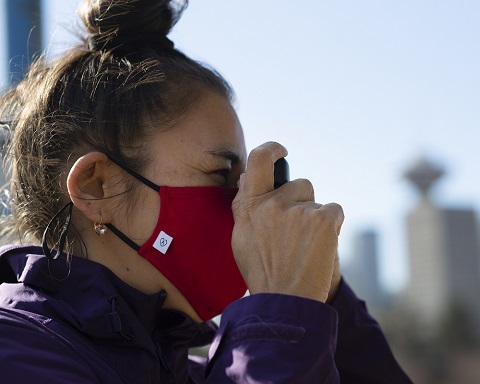Victoria City Mayor Lisa Helps recently invited a crack team of Megaphone vendor-reporters into her office. They quizzed her on about the homelessness crisis, welfare rates and affordability, and even parking in the capital city of British Columbia. In a challenging and revealing interview she pledges to balance the voices of homeless people with property developers – and discloses her favourite way to relax.
By Megaphone vendors Evelyn Baron, Richard Gerrand, Craig Baron and Delisle Doucet

Evelyn Baron: At one time, you said you were going to go to Ottawa and talk to Prime Minister Justin Trudeau about the homeless crisis. Is that still the plan, and will you be talking to him about the $30 million plan to build brand new housing supporting the homeless?
Mayor Lisa Helps: That’s a great question. So, it is still the plan. I’ve invited Prime Minister Trudeau here, so we’ll see – on a number of occasions actually. He hasn’t said yes yet, but hopefully sometime soon. His minister of [social development], I’ve also invited, Minister [Jean-Yves] Duclos… Actually I think he is coming to Victoria, and I’ve invited him to meet.
The $30 million is tricky. We have $30 million from the local government and we have another $30 million from the provincial government. We have $60 million now to spend over five years for new housing. What we’re looking for is another $30 million from the federal government, but my understanding is the federal money has already been transferred to the provincial government and as we’re well aware, tent city is costing a lot and the province is going to buy I guess two new buildings, so that might cut into some of the federal money.
I was just in Winnipeg with all of the mayors and councillors from across the country, and we’re really pushing a national housing strategy. The prime minister has a guy named Adam Vaughan, a member of parliament in Toronto. He’s the parliamentary secretary to the prime minister on intergovernmental affairs, and he’s in charge of a national housing strategy.
They’ve committed to doing it this year so I think we can keep the pressure on.
EB: There are lots of new buildings going up in the city, and there’s not much parking in downtown Victoria. What are your plans to amend this situation?
LH: It’s an interesting question. Do we need another parkade [multi-story carpark]? Is that the best and highest use of city-owned land?
We’ve changed our parking strategy so we have the first hour free in any of the parkades, and the farther out you get from downtown, the cheaper it is to park. That’s actually bringing more people downtown.
One thing that I think we might be able to explore – or people could just do this anyway – most of the parkades empty out at night and most people who live downtown, if they have cars, need somewhere to park at night. So there’s nothing stopping them from parking in city parkades overnight. It means you have to walk a little bit farther to get your car in the morning, I guess, but I think there’s some ways to accommodate. There’s ways to use existing spaces more effectively.
“Housing affects everybody in British Columbia”
Delisle Doucet: We know that the welfare rate in B.C. is one of the lowest in the country, and the provincial government doesn’t seem like they intend to boost it. Since many people depend on it, is it possible for the city to implement something like a municipal welfare allowance for homeless people?
LH: I don’t think that’s something the city would want to do because then it takes the responsibility and the pressure off the province. I think what the city can do, and what every city across British Columbia should do, is make that a key issue in the upcoming provincial election. Housing should be the issue – housing, and income assistance, and disability rates. Those should be the issues, in my opinion, in the 2017 provincial election because it affects people who are homeless, it affects people who are low income and living in poverty, it affects people who are trying to raise young families, and it affects people who want to buy a house, and it affects people who are trying to be part of the work force.
Housing affects everybody in British Columbia, from the $375 shelter allowance to the fact that two parents working full time with two kids can’t afford to live in any of our major cities. It is a crisis all the way from the shelter allowance, all the way to affordable home ownership.
One of the things I’m going to do is work with other mayors across British Columbia to make that the election issue. We’ll talk about shelter allowance, we’ll talk about welfare rates, we’ll talk about disability, we’ll talk about affordable home ownership, we’ll talk about workforce housing, because it’s a problem for everyone. It’s something I think we can all unite on. [The current situation] is not sustainable.
If one of the mantras of this government, and I think of the NDP as well, is: jobs and a strong economy. Well, how are people supposed to ever get back into the workforce or be able to have extra money to spend in the economy if we’re giving less-than-subsistence money to live on?
DD: What do you think about legalising cannabis?
LH: Well, the federal government said they’re going to legalise cannabis in 2017. I certainly will wait for the federal government, and I’m supportive of that. In the meantime, you’ve probably noticed there are cannabis shops popping up everywhere in Victoria. So our level of government is creating a business-licensing regime, so that it’s fair.
I think the number one reason – I understand, from the prime minister – is that he wants to legalise cannabis to make sure that young people don’t have such easy access to it as they do today. I think that’s really important.
I’m looking forward to the federal government making some rules so that we can all follow them because one of the things that local government ends up doing is getting our hands into a whole bunch of things that we shouldn’t, like housing, like regulating marijuana, just because no one else is doing anything. So it’s a big challenge for local government.
“People who are experiencing homelessness are actually helping us to drive the solutions”
Craig Baron: Homeless levels in this city are at a crisis point. Tent city [a homeless encampment in Victoria, which authorities have been trying to clear] is the perfect example. These guys are standing their ground. How do you plan to work with the homeless people in Victoria and address the crisis at hand?
LH: By buying housing, by listening to them, and trying to be the in-between between the people who are homeless and the provincial government. People often want the provincial government, want [Housing] Minister Richard Coleman to go down to tent city and meet with the people, well the minister is not going to do that because he’s responsible for all of British Columbia. But I think the role we can play at the municipal level is we can be that bridge.
Part of my role as mayor is I’m also the chair of the Coalition to End Homelessness, a group of a lot of the service providers. We have what’s called a social inclusion advisory committee… people who are experiencing homelessness or have experienced homelessness are actually helping us to drive the solutions.
So the $60 million, for example, that I mentioned, we do have money to build new housing finally. But usually what happens is service providers will say, “I’ve got this piece of land or this donor, or whatever, and I’d like to build this kind of housing.”
Well, what we’re doing is working with people who are homeless, who have been homeless, working with Island Health, with BC Housing, working with a whole bunch of people to say, “You know what, actually this is what we need.” We need supportive housing for people who have chronic mental health and addictions. We need supportive housing for youth – that’s a really hidden one right now and really important – we need affordable housing for seniors.
We’ll get working with people who are homeless, who have been homeless and others – build a regional ‘housing first’ program from the bottom up based on actual need right now in the community, not based on someone’s idea of what might be good for their organisation. That’s a little bit controversial to do it that way.
CB: What do you do in your leisure time and why?
LH: What leisure time? [laughs]
I’m an introvert by nature so I find it very hard to be out in public all the time. How I kind of re-energise myself is being out in my backyard, putting my hands in the dirt, growing vegetables. What I love to do the most is I love weeding the garden. It is so satisfying. I love pulling weeds, I love the hot sun beating down on me and pulling all the weeds because then what’s left are the beautiful vegetables with just dirt around them. So that’s what I do.
DD: It is fun pulling weeds.
LH: It is! It’s so satisfying.




















